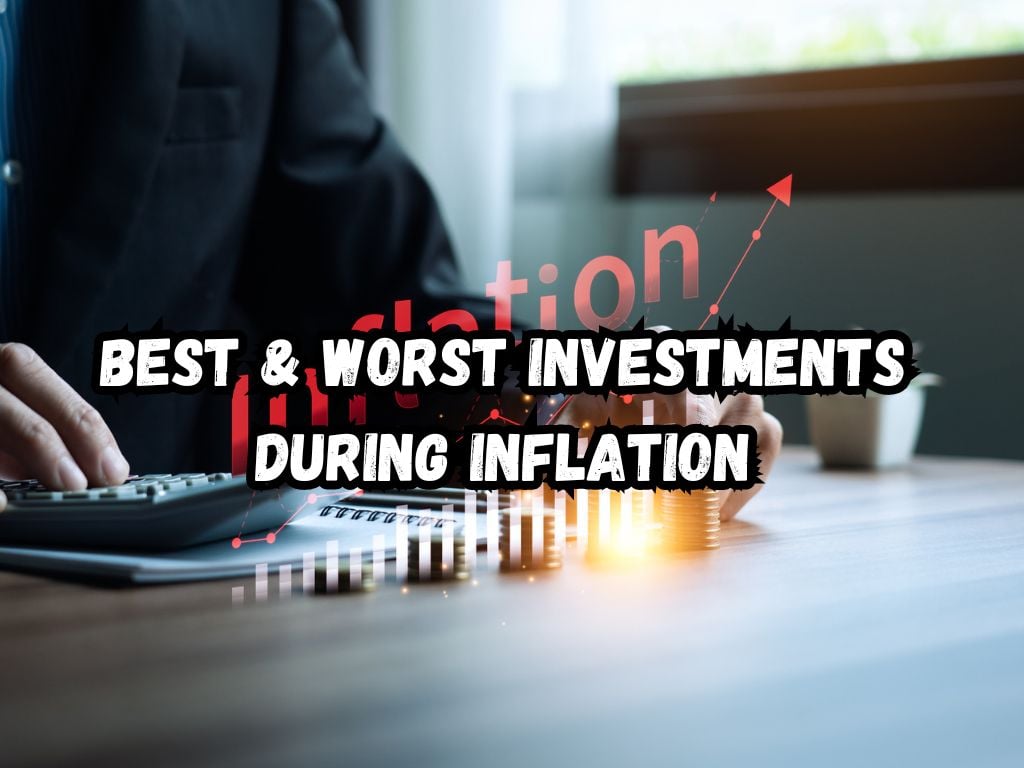Understanding how inflation impacts investments and identifying the best and worst investment choices during these periods is critical for preserving and growing one’s wealth.
Inflation, essentially the rate at which the general level of prices for goods and services rises, erodes purchasing power over time.
This article aims to provide a detailed overview of how to navigate investment decisions amidst inflationary pressures.
Understanding Inflation
Inflation signifies an economy in flux, featuring rising prices across a broad array of goods and services. Its causes are manifold, ranging from increased production costs to higher demand for goods.
Historically, inflation has varied, with periods of high inflation often leaving lasting impacts on investment portfolios.
Distinctions between transitory and persistent inflation are crucial, as each affects investments differently, necessitating varied strategic responses.

Best & Worst Investments During Inflation
When it comes to investments, inflation acts as a double-edged sword. On one hand, it can diminish the real value of cash and fixed-income investments.
On the other, some assets, like real estate and commodities, may benefit from inflation as their prices typically increase.
Developing a diversified strategy becomes paramount in such times to shield one’s portfolio from inflation’s adverse effects while seizing potential growth opportunities.
Best Investments During Inflation
Real Assets
Real Estate emerges as a robust choice during inflationary times. Its intrinsic value, coupled with the potential for rental income to adjust with inflation, makes it an attractive investment.
Whether through Real Estate Investment Trusts (REITs) or direct property ownership, investors find real estate a compelling hedge against inflation.
Commodities like gold, silver, and oil are traditionally seen as safe havens during inflation. These physical goods tend to retain value because their prices rise with inflation.
Investing in commodities can protect against the purchasing power erosion that characterizes inflationary periods.
Treasury Inflation-Protected Securities (TIPS)
TIPS offer a government-backed security choice that adjusts its principal based on changes in the inflation rate, ensuring the investment’s value is not eroded by inflation. They represent a direct tool for combating inflation’s impact on cash assets.
Stocks
Selecting the right stocks is key during inflationary periods. Companies with strong balance sheets, pricing power, and dividends tend to weather inflation well.
Dividend yields that outpace inflation rates can provide investors with a growth mechanism that also combats the purchasing power erosion caused by inflation.
Cryptocurrency
The role of cryptocurrencies as a hedge against inflation remains a matter of debate. While some view digital currencies like Bitcoin as “digital gold,” their volatility and relative novelty make them a speculative hedge against inflation.
Worst Investments During Inflation
Bonds and Fixed-Income Securities
Generally, bonds suffer during inflationary periods since the fixed interest payments lose real value as purchasing power decreases.
While short-term bonds might offer slight protection due to their quicker turnover, long-term bonds are particularly vulnerable.
High Cash Holdings
Holding large amounts of cash in a portfolio during inflation is akin to watching the purchasing power of that cash diminish day by day. While having liquidity is important, overexposure to cash can be detrimental in the long run.
Certain Types of Stocks
Not all stocks fare well during inflation. Industries sensitive to interest rates, such as utilities, or companies with high debt levels, often find it harder to navigate inflationary periods.
Their reduced pricing power and increased costs can lead to lower profit margins.
Investment Strategies to Consider
Diversifying one’s investment portfolio is a tried-and-true strategy for dealing with inflation. Incorporating a mix of real assets, equities, and inflation-protected securities can provide a balanced defense against inflation’s adverse effects.
Additionally, exploring alternative investments and regularly rebalancing the portfolio in response to ongoing economic indicators can further enhance one’s strategy.

Common Mistakes to Avoid
Investors often react hastily to inflation news, potentially making decisions that are detrimental in the long term. Overlooking the impact of taxes and investment fees can also eat into real returns.
Another error is neglecting the importance of a strategic, long-term investment approach that takes into account the inevitability of inflationary cycles.
Pro Tips
Stay proactive in managing your investment portfolio, with an eye on inflation indicators and economic policies that could signal changes in inflation trends. Remember to factor in the long-term implications of inflation on retirement planning.
A well-considered, diversified investment strategy remains your best defense against the unpredictable nature of inflation.
Frequently Asked Questions
How does inflation affect my investment returns?
Inflation diminishes the real buying power of your returns. Investments that do not outpace the inflation rate effectively lose value over time.
Are cryptocurrencies a reliable hedge against inflation?
Cryptocurrencies may offer some protection against inflation, but their high volatility and uncertain regulatory future make them a risky option.
How often should I review my investment portfolio during inflation?
Regular reviews are advisable, at least annually or whenever significant economic shifts occur.
Can investing in foreign markets protect me against inflation in my home country?
Diversifying by investing in stable foreign markets can offer protection, but it also introduces risks related to currency fluctuations and geopolitical uncertainties.
What is the best investment during hyperinflation?
Tangible assets like real estate and commodities traditionally fare better, as their values tend to rise with inflation.
In a world where economic conditions can shift unexpectedly, understanding the dynamics of inflation and its implications on investments is essential for everyone from the savvy investor to the personal finance novice. With the right strategy, it’s possible to not just weather inflation, but to turn it into an opportunity for financial growth.
Conclusion
Navigating inflation requires a careful, informed approach to investment. By focusing on assets that traditionally perform well during inflationary periods—such as real estate, certain commodities, TIPS, and selective stocks—investors can safeguard their portfolios.
Equally, steering clear of investments negatively affected by inflation ensures the maintenance of purchasing power over time.
Regular portfolio reviews and adjustments, along with a diversified investment approach, will offer the best protection against the erosive effects of inflation.
Meta Description:
Explore the best & worst investments during inflation. Secure your financial future effectively.


 Tags:
Tags:










